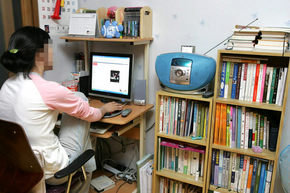Posted on : Nov.6,2006 14:05 KST
Modified on : Nov.7,2006 15:36 KST
State-run homes send most residents packing at age 18
A high school senior, Lee Ja-yeon (not her real name), recently applied to 10 colleges, but she has not yet received a letter of acceptance. Every high school student waiting to hear from schools is impatient right now, but the situation of Ja-yeon, 17, is more serious than that of others. If she can’t enter college, she must leave her home and set off into the world.
Ja-yeon’s parents are not kicking her out: they did so long ago. When she was 12 years old, her parents divorced, and chose to place her in an orphanage rather than continue to raise her. But Ja-yeon will have to leave the orphanage in February of next year, when she turns 18. Except for residents who enter college or vocational training or are suffering from disease or disability, those who reach 18 can no longer receive the help of state-funded children’s residences.
"Like other children, I would like to live my life worrying only about school," said Ja-yeon.
But she cannot. And according to statistics of the Ministry of Health and Welfare, about 19,000 children live at 278 child-care institutions, with about 800 to 900 18-year-olds every year facing the same problem as Ja-yeon does. In the first half of this year alone, 766 so-called "young adults" were pushed into society with only 3 to 5 million won (US$3,000-5,000) in resettlement funds to their name.
Kim Eun-ha (20, not her real name) who entered society this year after living in an orphanage and then a state-run residence. She was able to learn how to do manicures with her resettlement money of 3 million won, and was earning a monthly wage of 800,000 won. She wanted to live on her own, but due to an unexpected accident, she had to use all her savings. She has since become a worker in a noraebang (Karaoke room) and stays at the home of a friend.
"I don’t think this is the right way to live, but unless I do this, I will be homeless," she said.
While those who enter training or school are allowed to live in state-run residences until they are 25 years old, there are just 13 such centers nationwide, and they can accommodate only 245 persons total. More than two-thirds of residents at orphanages must find their own homes after they turn 18.
There are some, of course, who become independent successfully and find a home while staying at the welfare centers. A 24-year-old woman, who lived in an orphanage since she was four years old, received help from a self-reliance institution and is now a dental hygienist. She was lucky enough to get a spot at a public-housing unit in Sangdo-dong, where she will move for a deposit of 25 million won and rent of 100,000 won a month.
"I am glad that I have come to live independently," she said, "but I am afraid when I think that there is no one to look out for me."
The Ministry of Health and Welfare conducted a survey on the whereabouts of 1,976 persons who have left orphanages between 2003 to 2005. The survey showed that about 32 percent, or 638 persons, live in company dormitories, 8.4 percent (166) in the houses of friends or acquaintances, 7.4 percent (146) in state-run residences, 1.3 percent (25) in school dormitories, and 0.6 percent (11) live in group homes. Given these figures, the housing situation of about half of them was unstable. Those who have their own homes numbered just 3.6 percent, or 71, and those who lived in rental houses amounted to 39 percent, or 766 persons.
The government announced measures to support these young adults in January, such as granting them top priority to move into permanent public rental housing and extending them loans for making the rent. The government began enforcing its amended "regulations for housing supply" on August 18.
However, there is not a sufficient amount of public housing, so it takes a long time to get a place in such apartment complexes.
Yun Gyeong-ok, a social welfare worker at the Sangrok Self-Reliance Institution in Seoul said, "Even if [these young adults] get top priority for public rental houses, they have to wait two or three years before getting a place at such houses in Seoul. Instead of forcing them to leave orphanages at age 18, such institutions should provide proper educational and vocational opportunities so that they can settle in society."
[englishhani@hani.co.kr]

